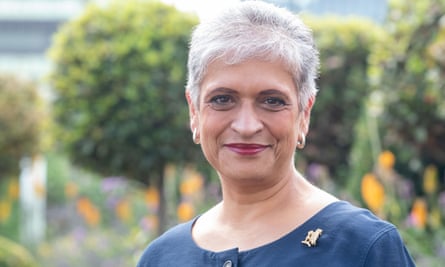Ill patients are refusing sicknotes from their GP because they cannot afford time off work, while physicians suffer “moral distress” at their powerlessness to do more to help the most vulnerable, the new leader of Britain’s family doctors has revealed.
More patients are experiencing asthma attacks or other serious breathing problems because they cannot afford to heat their homes, said Dr Kamila Hawthorne, the chair of the Royal College of GPs, while many have reported deteriorating mental health due to financial stress.
Soaring food costs are also leading to a rise in fatigue, mouth ulcers and weak muscles, with people deficient in key vitamins because they cannot afford to eat anything other than a poor diet.
So many patients are presenting with complex physical and psychological problems related to poverty, domestic violence, childhood abuse or poor housing that GPs are suffering psychologically from their inability to take the requisite action, she said.
Hawthorne, a GP in the Welsh valleys, warned that illness linked to rising pressures on household budgets would also put even greater strain on already overstretched family doctor services.
It comes as leading medics warned that more GPs are leaving the profession than entering it, with Hawthorne saying new trainees entering the profession “won’t be enough” to meet growing healthcare needs.

Hawthorne said: “Recently I’ve had patients refusing sicknotes because they can’t afford not to work. Quite often, when it’s clear that somebody needs some time off, they won’t take it.
“These are people who ideally, medically, should not be at work [because] they have a chronic condition such as asthma or diabetes, but quite often mental health problems, quite severe mental health problems, I [see] some cases that really do require a bit of sicknote peace and quiet to try and help them get better.
“I’ve been really surprised in the last year that when I’ve offered a sicknote they’ve said: ‘Oh no, no, I can’t take time off. I need the money from work.’ They’ve refused. They say: ‘I need to keep working to earn and to feed myself and my family.’ I don’t take it personally, of course, but I feel sad for people because for a few minutes you enter their lives and see that it’s really tough.”
Those refusing sicknotes are mainly young to middle-aged adults, including people who work in call centres, but it is also seen in people with young families and older people, Hawthorne said.
Soaring food and energy prices have left some patients unable to afford transport to attend appointments at the GP surgery that she and her colleagues run near Pontypridd – or even to get to hospital for pre-booked treatment.
Her comments came as Rishi Sunak warned that this winter was going to be “challenging” for the UK as a result of fast-rising prices, strikes and long waits for NHS care.
The prime minister told the cabinet at their weekly meeting on Tuesday that the months ahead would bring widespread misery as they discussed how to alleviate the crises. A spokesperson for No 10 said: “Looking ahead to winter, the prime minister said this would be a challenging period for the country caused by the aftershocks of the global pandemic and the ongoing conflict in Ukraine.”
The coming cold spell will make things even worse for patients’ health and welfare, Hawthorne fears. “The cost of living crisis has been there for a long time. But it’s suddenly got a lot worse in the last couple of months. I’ve now got patients who are worried about fuel costs this winter, who’ve not turned on their heating yet and are keeping their windows shut.
“People are very, very anxious about what’s to come and whether they’re going to have to choose between heating and eating.
“The moral distress among GPs comes from not being able to do more [to help people with complex problems]. We can help most people who come to see us as they have, for example, a skin rash, period problems or anxiety and depression. More and more, however, we’re seeing people with intractable social and psychological problems that are very difficult to solve,” she said.
She added: “Some people have got really awful histories. GPs are trained to help sort people out. But when we’re faced as GPs with insoluble problem after problem after problem, that can be quite gruelling to watch.
“That sense of hopelessness that the patient brings with them gets transferred to you as a GP. When it’s patient after patient after patient, you go home really at the end of the day feeling like a wrung-out lemon. It’s quite exhausting.”
GPs are also distressed at seeing patients’ health worsen because they have been stuck for so long on NHS waiting lists, she added. “It’s particularly people with painful hips and knees, people who are now crawling up the stairs, because they can’t walk up any more and the only toilet is upstairs.”
Hawthorne said she had also noticed a rise in folate deficiency, a lack of B vitamins in some patients, spurred on by a poor diet precipitated by poverty. She urged ministers to spend more on energy and food vouchers for the most vulnerable patients.
Expanding eligibility for free school meals would also help alleviate the desperate situation in which some families had found themselves.
Hawthorne also criticised ministers for “GP-bashing” and their recent pledge that patients would be able to see a GP within two weeks, and on the day if it is urgent, which she said ignored the underlying issues. “Ministers must know that this policy is undeliverable. The number of GPs is falling and the number of patients we’re seeing is rising. Being a GP is becoming untenable, unworkable, undoable. It’s such a grind that people are retiring as quickly as they can.
“Insisting on this two-week rule, when they know access to GPs is a problem, will actually make the problem worse.”
In 2022, 4,032 trainee GPs were accepted on to placements, according to new figures published by Health Education England. Hawthorne said she was “encouraged” by the number of new recruits, but warned that it “won’t be enough to meet current or future healthcare needs”. The Royal College has estimated that up to 19,000 GPs could leave the profession in the next five years due to workload pressures.
The Department of Health and Social Care has been approached for comment.
Read More: World News | Entertainment News | Celeb News
Guardian







